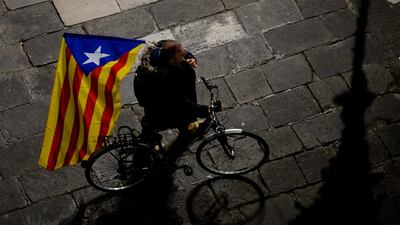Spain’s economy is going to pay a price for Catalonia’s bid for independence.
While the prime minister Mariano Rajoy has stepped in to take over the region, upcoming Catalan elections could prove another flashpoint for the independence movement. For Oxford Economics, that means lingering uncertainty, posing a risk to sentiment, share prices and bonds.
In their worst-case scenario, Spain’s expansion would be weaker and the economy would be €17 billion (Dh79.9bn) smaller in 2019 than would otherwise have been the case. That “adverse” view - not Oxford’s central projection - assumes a permanent increase in bond yields of 50 basis points and a 10 per cent decline in stocks in 2018 and 2019 compared with its baseline scenario.
“The economic impact of the Catalan independence crisis is still unknown, but the increased political tensions have already caused uncertainty to surge to the highest levels in over a decade,” said the senior euro-zone economist Angel Talavera.
_____________
Read more:
Uncertainty abounds for Catalonia's business community
Euro falls most this year on ECB bond decision and Spanish woes
_____________
The Catalan crisis erupted on October 1 when the former regional government held an illegal referendum on independence that it claimed as a mandate to declare independence from Spain. Mr Rajoy responded by invoking constitutional powers to disband Catalonia’s government, dissolve its parliament and call regional elections for December 21.
As hundreds of companies, led by CaixaBank, move their legal headquarters out of the area, the economy minister Luis de Guindos has warned that the crisis is taking its toll on both the Catalan and Spanish economies. Spain’s benchmark IBEX 35 stock index has dropped about 3.5 per cent since the end of September while the spread on 10-year Spanish debt over German bonds is little changed.
Oxford’s analysis also takes account of a so-called economic policy uncertainty index, which measures the number of news articles that contains the word “uncertainty” and related terms in Spain’s main newspapers as a gauge for political risk. It exceeded levels seen in 2016, when Spain was struggling to form a government, and household and business confidence will suffer if levels remain high, according to Ms Talavera.

